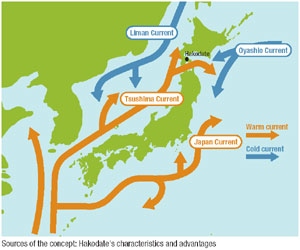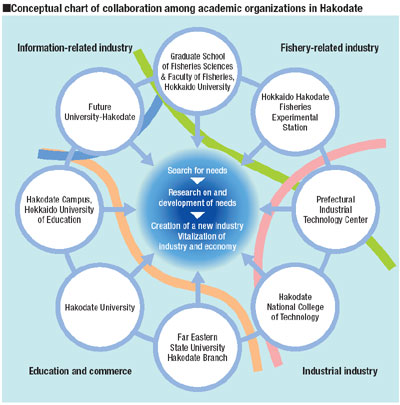Ocean Newsletter
No.75 September 20, 2003
-
Significance and future direction of technology development relating to underwater welding & underwater cutting systems
Yoji Ogawa Institute for Marine Resources and Environment, National Institute of Advanced Industrial Science and Technology
In order to utilize the oceans more directly and effectively, it is necessary to establish technologies for economical construction, maintenance and inspection of platforms that can be the bases of various activities. Welding and cutting under water are critical technologies for marine structures, and the technology development for higher quality as well as automation and systematization for more economical works have been investigated.
-
Conception of Hakodate as an International Ocean City
Yataro Numasaki Vice-president, Promotion Committee for International Ocean City, Hakodate, and former President, Laboratory for Marine Science Creation / Selected Papers No.6(p.9)
Hakodate City in Hokkaido had once been developed as "a city of the northern-sea fishery, shipbuilding, and the Seikan Ferries." Now, it is aiming at becoming "a central city for academics and research that can play a world-leading role in marine science," based on a new conception in which the superiority of the Hakodate area relating to fishery and oceans can be utilized. It is hoped that Hakodate City can achieve the status of an international ocean city, such as Naples in Italy or Woods Hole in the USA.
Selected Papers No.6(p.9) -
Present status of the education on "the sea" by judging from textbooks used in elementary schools and junior high schools
Norihisa Yokouchi Professor, College of Science and Technology, Nihon University
It is said that people of Japan show a low degree of interest in the sea, despite the fact that Japan is completely surrounded by seas. It has often been pointed out that one of the reasons might lie in insufficient education on the sea in the school system ranging from elementary schools to universities (postgraduate schools). For this reason, the number of descriptions on the sea in actually-used textbooks was counted, in order to estimate to what extent education on the sea has been performed in elementary schools and junior high schools, the schools of compulsory education in Japan. As the result, it was found that items relating to the sea account for approximately 8% of the total pages of textbooks for main subjects used in elementary schools and junior high schools.
Conception of Hakodate as an International Ocean City
Hakodate, which developed as a town known for its northern-sea fisheries, shipbuilding, and the Aomori-Hakodate ferryboat, now aims at becoming an academic and cultural city as well as a world leader in marine science, making best use of its regional advantages with regard to fisheries and ocean affairs. ""Our goal is to be known as an international marine city like Naples in Italy or Woods Hole in the U.S.""
Regional advantages of Hakodate
 Hakodate City is a regional hub city in the southern part of Hokkaido, surrounded by three different seas (the Pacific Ocean, the Tsugaru Straits and the Sea of Japan). Because the warm Tsushima Current and the cold Liman and Oyashio Currents flow into the surrounding sea areas, they form good fishing zones for squid, salmon, kelp, sea urchins and abalone, making the city famous in Japan for its large catches. As the city is surrounded by water on three sides, in comparison with other regions the ocean plays an important role in people's daily lives.
Hakodate City is a regional hub city in the southern part of Hokkaido, surrounded by three different seas (the Pacific Ocean, the Tsugaru Straits and the Sea of Japan). Because the warm Tsushima Current and the cold Liman and Oyashio Currents flow into the surrounding sea areas, they form good fishing zones for squid, salmon, kelp, sea urchins and abalone, making the city famous in Japan for its large catches. As the city is surrounded by water on three sides, in comparison with other regions the ocean plays an important role in people's daily lives.
There are also a number of academic organizations related to fisheries and ocean affairs: the Graduate School of Fisheries Sciences & Faculty of Fisheries, Hokkaido University, which is a leading research and educational organization in fisheries and marine matters; the Future University-Hakodate, which gained national attention as a unique information-oriented university; Hakodate National College of Technology, which has been actively working on collaborative research with local private companies; the Prefectural Industrial Technology Center, which has been researching and promoting advanced technology in the biotechnology and aquatic food processing fields; and Hokkaido Hakodate Fisheries Experimental Station.
In addition, industries related to fisheries and ocean affairs are concentrated in Hakodate, such as the aquatic food manufacturing industry, which utilizes local marine products; the shipbuilding industry, which has the largest shipyard in the Tohoku and Hokkaido regions; and the related maritime machinery manufacturing industry. In particular, various squid processed products are produced in the southern part of Hokkaido in quantities larger than most other parts of the nation (shares of the domestic market: 23.7% of squid products, 37.5% of fermented squid products, 63.6% of dried squid, and 80.0% of smoked squid). Research and development regarding means for utilizing squid entrails and other items and for transporting live squids have been actively pursued through collaboration with industry, educational institutions and the government, making significant contributions to local industry.
In these and other ways, Hakodate City is advantageously located for conducting research, technological development, and projects related to fisheries and the oceans. Being blessed with tourist resources that include Mt. Hakodate, which is said to provide the world's best night view, historical buildings, exotic streetscapes, a wide variety of fresh marine products, and hot springs, Hakodate is also a city of national and international tourism, visited by five million tourists a year.
Background of concept - creating a city with character
Though Hakodate City is a regional hub city in the southern part of Hokkaido, its population started to decrease from about the mid-1980s and the city faced a difficult economic situation due to lingering business stagnation after the collapse of the bubble economy.
As we are said to be entering a new age for regional centers in Japan, it is important to review the characteristics and advantages of Hakodate and cultivate them as part of its unique character, to differentiate it from other cities, and make it a place its citizens can take pride in.
With these goals in mind, the Committee of Hakodate Marine Science Inovation, which consists of 22 members from industry, educational institutions and government, was established in June of 2002, and the Hakodate International Fisheries & Marine City Concept was formulated in March of 2003 as a concept to enable Hakodate to make the best use of its unique characteristics and advantages. Scholars and specialists who are active in the front lines in Tokyo, Nagoya, Shizuoka and other places have also attended its meetings.
Hakodate: aiming to become a world leader in marine science
The Hakodate International Fisheries & Marine City Concept is still in its infancy and long-term efforts are required. However, as the business world and local public have particularly large expectations for the concept, the Committee for Promotion of the Hakodate International Fisheries & Marine City Concept was established immediately after formulation of the concept.
In June of 2002, The Algatech Kyowa Seaweed Technology Institute of Seaweeds opened in the city as the first private organization to support the concept. The laboratory started joint research with the Graduate School of Fisheries Sciences, Hokkaido University. The Hakodate area was also selected for the implementation of the Ministry of Education, Culture, Sports, Science and Technology's project to promote government-industry-academia collaboration in a city area; and large-scale research and development for the utilization of local major marine products, kelp and squid, are now underway.
At the end of August, the city was designated as a ""Marine Frontier technology research zone"" by the national government. Until recently, regulations were stringent regarding the private sector's use of national research institutes and foreign researchers' stays, which obstructed research and development. However, due to the special zone designation, it has become easier for private companies to conduct joint research with the use of facilities in the Graduate School of Fisheries Sciences, Hokkaido University, and conditions for foreign researchers' stays have improved. For example, the period of foreign researchers' stays at the Graduate School of Fisheries Sciences, Hokkaido University, and Future University-Hakodate were extended, and foreign researchers are now allowed to engage in business activities.
The concept aims at creating an ""international academic and cultural city with regard to fisheries and ocean affairs,"" utilizing the above-said unique characteristics and advantages of Hakodate. We want to make Hakodate an international ocean city that leads the world in marine science, like Naples in Italy, or Woods Hole in the U.S., by working on advanced, highly creative research, and by the development of innovative technology in cooperation with the local sector and academic organizations.
Through our efforts toward realization of this concept, we firmly believe that we will be able to contribute to the realization of ""a nation based on the creativity of science and technology,"" at which Japan aims, to promote the creation of new industry, as well as to revitalize existing industry and the economy of the city. For details of the concept, please visit our website.

